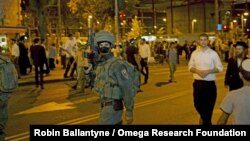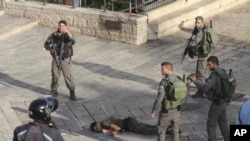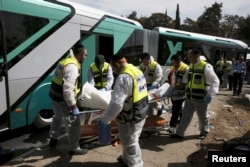Israel has deployed hundreds of soldiers across the country to help police meet the threat of Palestinian stabbings and other attacks that already have killed at least seven Jews and spread fear throughout Israel. Thirty-one Palestinians also have died in recent incidents.
The Israeli Security cabinet already has given police permission to seal off Arab neighborhoods of Jerusalem from which many of the attackers have come. Police have also put up roadblocks in Palestinian areas of east Jerusalem and say the property of terrorists will be confiscated and their permanent residency rights will be revoked.
Israel's internal security chief Gilad Erdan said Wednesday the bodies of Palestinians killed for attacking Israelis will not be returned to their families. Erdan said they do not deserve the "respect" of a proper burial. He said Palestinian funerals often become "an exhibition of support for terror and incitement to murder."
Spike in violence
Wednesday's violence includes Israeli police killing a Palestinian who stabbed a 70 year-old woman outside Jerusalem's main bus station. Another Palestinian was killed when he tried to stab a policeman at the entrance to Jerusalem's Old City. At least 31 Palestinians have been killed so far for attacking Israelis or throwing rocks and firebombs at Israeli soldiers.
The surge in violence between Palestinians and Jews began nearly a month ago.
Rumors spread through Arab neighborhoods that Israel was planning to take over an east Jerusalem holy site Muslims call the al-Aqsa mosque and Jews call the Temple Mount.
Israel strongly denies the allegations and accuses Hamas, the Palestinian Authority, and a group called the Islamic Movement of continuing to repeat the rumor and incite Palestinians to riot.
But Palestinians are also frustrated by continued Jewish settlement in the West Bank, which they want as part of a future state. Many are also unhappy with Palestinian President Mahmoud Abbas. They regard him as weak and a reason why a two-state peace deal has become more and more remote.
Peace talks
Israeli Prime Minister Benjamin Netanyahu said Wednesday he is willing to resume peace talks, but that Palestinians must make a major concession.
"In order for peace to be achieved, the Palestinians must finally recognize the right of the Jewish people's nation state to exist."
Abbas accused Israel of executing Palestinian protesters, including teenagers. He said Jewish settlers terrorize the Palestinian people, destroy their property and attack their and holy sites.
"We will continue with our national struggle which is based on our right to self-defense, peaceful popular resistance, and political and legal struggle," Abbas said on Palestinian television Wednesday.
The U.S. State Department says Secretary of State John Kerry will travel to the region soon to look for ways to stop the violence and restore calm to give peace talks another chance.






